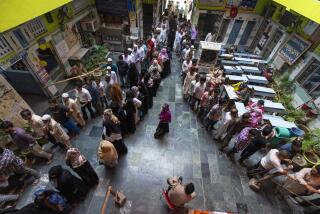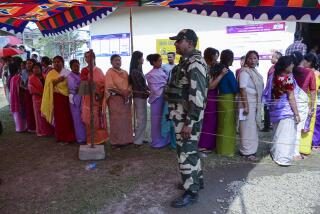Nepalese Brave Threats, Fistfights, Long Treks to Usher in Democracy : Elections: The first free balloting in more than 30 years is considered fair. Results from remote areas are not expected for days.
- Share via
NAGARKOT, Nepal — By the millions, they walked for hours across the highest mountains in the world, then stood for hours in the baking Himalayan sun, occasionally braving fistfights, death threats and fear, all to cast a single ballot that would help usher democracy into their long-oppressed kingdom.
As the sun set Sunday on the first real day of democracy for Nepalese in more than 30 years, many of them refused to go home. Instead, they helped police escort ballot boxes on hours-long treks to town centers, where they gathered throughout the night to follow the count, watching and waiting to see the final results of Nepal’s march toward freedom.
Tens of thousands of soldiers and riot police were deployed Sunday night outside those centers and in sensitive districts throughout the country. The balloting in at least 21 of the nation’s 13,707 voting booths had to be suspended when violence erupted in grenade throwing, knife fights and punching between rival political groups.
But, with more than 60 foreign poll observers representing 20 nations deployed nationwide on election day, it was clear that Nepal had successfully staged its first free and fair elections in three decades.
“No matter which party comes to power tomorrow, democracy already won today,” said Sharma Bishnu Kanta, the chief poll officer in Nagarkot, a mountaintop village 6,000 feet high and so remote that Kanta had to carry his ballot box for three hours across terraced slopes to reach the nearest counting center late Sunday night.
So isolated are most of the polling stations, some accessible only by helicopter or four-day hike, that final results may not be known until the end of this week. Clear trends in the voting also will not emerge until later today at the earliest, despite the fact that officials at most centers planned to work day and night to complete the count.
The main rivals for control over this landlocked and impoverished nation of 19 million, which has been ruled by a succession of autocratic kings and their prime ministers for all but 10 of its several thousand years, are the veteran politicians of the Nepali Congress Party and a largely young and idealistic Communist alliance campaigning under the banner of the United Marxist Leninist Party.
The Congress Party, which governed Nepal during its brief democratic experiment in the 1950s, has a clear edge in the voting, in which a huge turnout officially estimated at well over 60% nationwide indicated the wide participation of what analysts here call Nepal’s moderate, silent majority.
But most Nepalese and Western analysts believe that the Congress Party, led by Nepal’s interim Prime Minister Krishna Prasad Bhattarai, may fall short of winning a majority in the newly created 205-seat House of Representatives.
Under the parliamentary system created when Nepal’s King Birendra approved a new democratic constitution last year, the Congress Party would then have to form a coalition, either with the Communists or with the nation’s third political force, a collection of former royalists closely associated with the king. Birendra had ruled over the nation without challenge until a grass-roots, popular rebellion forced him to bow to democratic reform a year ago.
Nepal’s Communists, who expect to win at least a quarter of the seats in Parliament, represent the only growing Communist movement in the world today, successfully defying the international trend against communism largely because of Nepal’s crushing poverty and its 30-year political time warp. And many Nepalese analysts fear a backlash from the left, similar to the street clashes that left more than 50 dead a year ago, if they feel cut out of power when the new government is formed.
Those fears were evident as early as Sunday night, when thousands of soldiers and riot police took up positions inside Bhaktapur, an ancient city adjacent to Katmandu, the capital. It has been a prominent Communist stronghold since angry mobs beat, paraded, dismembered and killed a government official when he came to inspect the town after a devastating earthquake several years ago.
Indeed, human rights activists in Bhaktapur on Sunday did report allegations of widespread cheating there. But ironically, the guilty parties named represented not the old-line monarchists but the most extreme Communist candidate, Rohit Narayan Man Bijukchhe, who was among those imprisoned for the Bhaktapur lynching several years ago.
At a news conference Sunday night, Election Commission Secretary Achyut Narayan Rajbhandari described such incidents nationwide as “minor,” adding that 25 people had been injured, none seriously, and no one had been killed during the day.
He said police had to fire blanks to break up melees at two polling places, adding that, in the one booth where ballot boxes had been stolen by Communist extremists advocating a boycott of the polls, police recovered the boxes and arrested the offenders.
But as the Sunday night news conference degenerated into a screaming match, with long-censored and repressed reporters now representing various parties shouting insults and allegations at the official, it was clear that Nepal faces several months of uncertainty and possible unrest, regardless of the election’s outcome.
“After the pro-democracy movement, the aspirations of the people have been very high. Everyone wanted everything to be done right away,” said Dr. Bharat Pradhan, the deputy director of Bir Hospital in Katmandu and a key figure behind the movement that forced King Birendra to capitulate last year.
“Now, immediately after the new government comes, we expect a big uprising. The people cannot wait much longer. The problems are so much, and for so long they were repressed. And the demands are almost unbearable for any government.”
It was those same aspirations that could be seen at virtually every polling place in Nepal on Sunday, where the first voters arrived and long lines began forming even before sunrise.
“It is better to come early when the head is clearest and when you’re sure to be counted,” said businessman Pradhan Prabul, 35, who arrived at his Katmandu polling booth at 5:30 a.m.
When asked for whom he voted, Prabul echoed the sentiments of most of Nepal’s emerging middle class, who reject the Communists’ main charge that the Nepali Congress Party will align itself too closely with India, the huge and powerful neighbor to the south.
“It is better to take the side of the trees,” he said, referring to the Congress Party, as do most of Nepal’s voters, by its party symbol rather than its written name. “The other party is not so good for the country.”
Throughout the campaign, the Congress Party stressed that a Communist government in Nepal would jeopardize the nearly $2 billion in annual foreign aid that is Nepal’s economic lifeline, most of it from Japan and the West.
And, in interviews with dozens of voters, it was clear Sunday that, despite their lack of education, the Nepalese political consciousness has soared in the last year.
More to Read
Sign up for Essential California
The most important California stories and recommendations in your inbox every morning.
You may occasionally receive promotional content from the Los Angeles Times.










